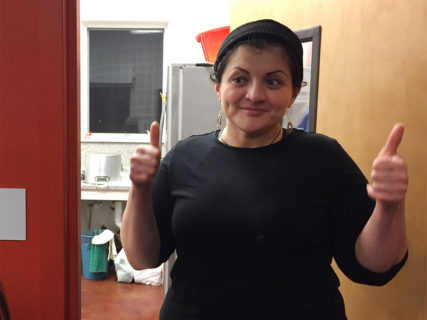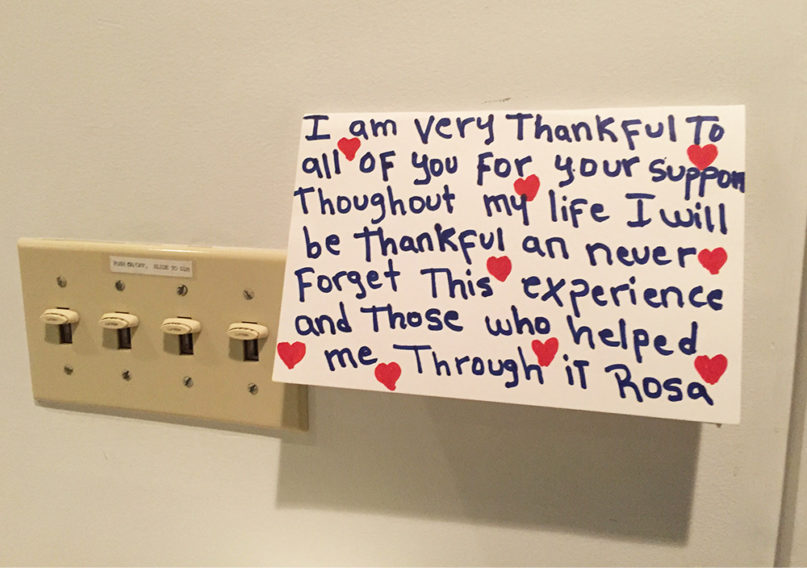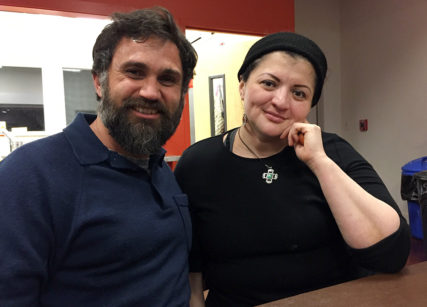
CHAPEL HILL, N.C. (RNS) — Rosa del Carmen Ortez Cruz admits there were days she wanted to stay in bed and hide under the covers.
For nearly two years the Honduran native took sanctuary from deportation at Church of Reconciliation, not knowing if she would ever be able to emerge from her confinement.
This week, a three-judge panel of the U.S. Court of Appeals for the Fourth Circuit ruled Wednesday (Feb. 26) that immigration authorities may not deport her. The unanimous ruling means Ortez Cruz will be entitled to stay and work in the United States for the foreseeable future.
Soon, the 38-year-old mother of four will reunite with her four children and get on with her life.
“I feel like there’s been a weight lifted from on top of me,” Ortez Cruz told Religion News Service. “I still have some fear, but I feel more secure. Now I know if they come after me they’d have to release me.”

Rosa del Carmen Ortez Cruz at the door to the kitchen at the church where she took sanctuary from deportation in North Carolina, Feb. 27, 2020. RNS photo by Yonat Shimron
Ortez Cruz fled Honduras for the United States in 2002, after her domestic partner, the father of her first child, stabbed her multiple times in the stomach. The Church of Reconciliation and the Chapel Hill Mennonite Fellowship — both meet in the same building — offered her refuge from immediate deportation 22 months ago.
Ortez Cruz did not qualify for asylum because she waited too long after crossing the U.S. border to file a claim. But she argued she cannot return to Honduras, since she fears her ex-partner may kill her. The Fourth Circuit agreed, finding that the Board of Immigration Appeal erred by not providing any evidence that it would be safe for her to return to Honduras.
“We’re thrilled the court granted her withholding of removal,” said Ann Marie Dooley, a lawyer with McKinney Immigration Law, which has represented Ortez Cruz since 2013.
“Once Rosa showed she suffered persecution the burden of proof shifted to the government,” Dooley said. “They didn’t present any evidence that Rosa would no longer be in danger if she went back. The higher court said that was improper.”
Nationwide, there are 47 undocumented immigrants who have publicly announced they are taking refuge in U.S. religious congregations, according to Church World Service, which maintains a database. That includes Ortez Cruz, who will remain at the church for the next few weeks until her lawyer receives confirmation from the immigration court that they have received the Fourth Circuit’s ruling and will no longer pursue deportation.
Houses of worship are considered “sensitive locations,” meaning that federal immigration enforcement officers will avoid arresting, searching or interviewing people there under most circumstances.

A card Rosa del Carmen Ortez Cruz hung on a wall near her bedroom at the Church of Reconciliation in Chapel Hill, North Carolina, thanking volunteers for sheltering her there. RNS photo by Yonat Shimron
Although she has had her hard days, Ortez Cruz found ways to occupy herself while in sanctuary. She took over the church kitchen, cooking pupusas, empanadas and taquitos. Twice a month, she prepared a fellowship meal for the Chapel Hill Mennonite Fellowship, which meets at the church. She offered to cater meals for takeout.
Last Thanksgiving she helped prepare food for a local homeless shelter.
“I feel like something in me has changed, and I’ve learned to be a better person,” Ortez Cruz said. “When I’m freed, I want to help people in need.”
Last year, Ortez Cruz was one of a dozen people taking refuge in sanctuary churches who received a letter from Immigration and Customs Enforcement informing them they owe hundreds of thousands of dollars in civil penalties for disobeying orders to leave the country. After her lawyer appealed, ICE notified Ortez Cruz it was dropping the $300,000 fine.
Ortez Cruz was embraced by two congregations meeting at Church of Reconciliation — an older Presbyterian congregation and a younger Mennonite group. She said she formed close ties to members of both churches.

Rosa del Carmen Ortez Cruz, right, and Pastor Isaac Villegas of the Chapel Hill Mennonite Fellowship. Ortez Cruz took refuge in a church for nearly two years. On Feb. 26, 2020, a federal court ruled she may not be deported. RNS photo by Yonat Shimron
Isaac Villegas, pastor of the Chapel Hill Mennonite Fellowship, said a total of 160 people from 11 congregations volunteered to help Ortez Cruz during her nearly two-year confinement. One volunteer stayed at the church with her every night in case Immigration and Customs Enforcement came knocking. Others helped wash her laundry once a week (the church doesn’t have a washing machine) and buy her groceries.
The two main churches also raised money to foot her legal bills.
“We’ve grown together,” said Villegas. “She’s part of our church life. We’ve come to share lives together. It will feel strange and probably empty to not have her here.”
Ortez Cruz said her biggest hardship was being away from her children who have been living with relatives in Greensboro, 55 miles away. She plans to stay in Chapel Hill and looks forward to bringing her family there.
“I feel like I’ve built a community here,” she said. “They always greet me with so many hugs. I know they care about me a lot.”
Her one sadness is knowing that many others who have taken sanctuary in churches don’t have any idea when they may be able to leave. In the 22 months she has been at the church, she formed close bonds with many of them.
“They’re happy for me,” she said. “But I can sense they’re sad, too.”
